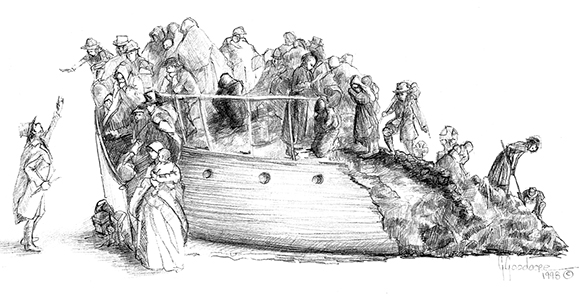The potato blight arrived in Ireland in the late summer of 1845.
Pest, parasite, fungus, invisible and invincible,
it stuck across Europe, the same sudden, unstoppable invasion everywhere.
Infection, corruption, devastation.
But Ireland was a special case.
Ireland was a place where for millions of people, the potato was neither staple nor supplement, but sustenance: Life.
Amid the blasted, ruined crops, women in the fields covered their heads, cried, keened, mingled anguish with their pleas, beseechment of God, the government, the landlord.
Words from the ancient Hebrew psalms were prayed in Irish, English, Latin, O Lord God of Hosts, hear our prayer.
O God of Jacob, deliver us from famine.
The lords temporal in London heard.
Her Majesty’s Government took up once again the perpetual nuisance of Ireland.
Measures were taken.
American corn. Public works. Soup.
A variety of attempts in the face of spreading,
insistent starvation, until fatigue and frustration set in,
until the servants of the iron laws of economics laid bare
the logic of market forces: Let nature take its course, we cannot interfere.
The poor, they said, are the cause of their own misery, let them bear the consequences and learn to be ambitions.
The fault is not in the stars, or in the laws, but in the people’s wild, wastrel ways, in the guile and indolence of Irish beggardom.
The government turned away, but not before it ensured
that the grinding of the wheel wouldn’t go unoiled, that eviction
as well as starvation would help rid Ireland of its wretched burden
of subtenants whose very existence, it was said, blocked the path to progress.
These things happened.
Let history judge the simplicity or complexity of those events, the complicity of those responsible.
The rest is indescribable.
There is no lone word, or marriage of them, to capture the totality of what occurred, of those who perished, some from hunger, most from the slow withering it inflicted,
fever, diarrhea, exhaustion.
The famine was an end.
To lives. To families. To entire villages.
To young and old alike. Their suffering and death made bearable for us in the sanitation of numbers, in one statistic, faceless, nameless, unsexed: at least a million dead.
The famine was an exodus.
A wound that would not clot.
For everyone who could beg or borrow the fare, for those assisted by their landlords, there was emigration, escape in the slop-ridden holds of coffin ships, death at sea, on land, in fever hospitals and quarantine stations.
Two million people, a quarter of the Irish people, left in the space of ten years.
The famine was an arrival.
The hordes of fleeing exiles set the watchdogs to barking. The reception the newly landed found was often much the same as offered tribes of strangers before and since:
There are too many of them…They don’t have our values… They worship foreign Gods.
In a phrase: No Irish Need Apply.
The famine ended.
But it never went away.
It was there in the Fenian war cry, Remember Skibbereen!
It was there in memory, a mute shadow,
intact from one generation to the next, a sadness,
a longing, an imitation of shame, a passion for respectability,
a hunger for security, for the assurances of church and state that such a fate would never come again.
The time to take away the silence has come: in ceremony, ritual, art, music, scholarship, to honor the dead, to recount, to commemorate, to mourn what was lost – openly;
and to celebrate what survives, without apology or fear.
We have it in our power not only to remember what took place but to relive it.
To find in the immigrants, in the poor, in the hungry and the lost, not a different race:
But the starving, desperate Irish,
the faces and voices of our ancestors,
An image of ourselves. ♦


Leave a Reply